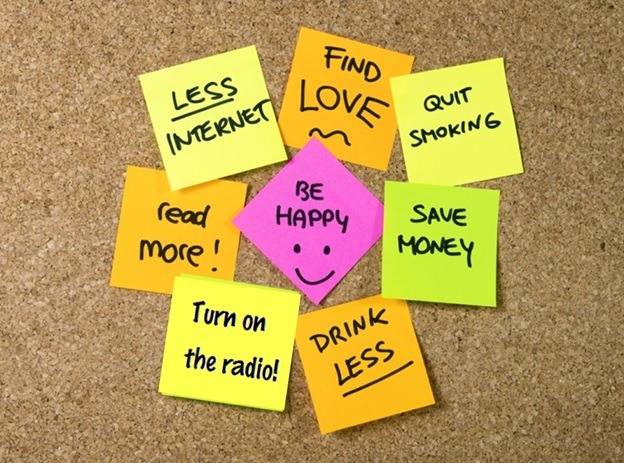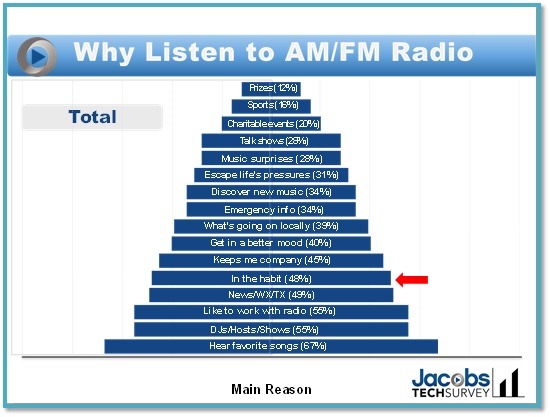A few years ago, we put a spin on our Techsurvey mission. In the early years, the guiding principle behind these massive nationwide web surveys was to determine what radio listeners are doing when they’re not listening to the radio.
As satellite radio, streaming, smartphones, and social media proliferated, getting a handle on how audiences are informing and entertaining themselves has helped radio better understand how the media culture is changing.
But in recent years, we’ve introduced the corollary question: With all the new media options, why do consumers still choose to listen to broadcast radio? To determine what it is about AM and FM radio stations that keep consumers coming back for more, we created a list of possible reasons for listening, and asked respondents to tell us which ones were the main ones that drive tune-in.
The end results are presented in the form of a pyramid where the reasons at the bottom are the most important ones:
So, of course, favorite songs and DJs/personalities are the main attraction. And that’s followed closely by working with the radio on and as well as news/weather/traffic information.
But next in line is listening out of habit, designated by nearly half of respondents as a main reason they listen to broadcast radio.
Some people have asked me whether this is a bad thing – whether habit is tantamount to listening out of default or boredom. But I believe the correct interpretation is that millions of people have made radio a part of their daily routine. And if you’re thinking that this broad overview doesn’t provide a more granular look at jaded younger consumers – particularly Millennials – it turns out that 52% of them cite habit as a main reason.
Great morning shows, formats that continue to deliver, and stations that connect consumers to their communities are all part of the fabric that creates habit-forming usage. It has always been a plus for radio to be a part of the daily routine – that first cup of coffee, the drive to work, and the ability to listen to the radio in the workplace.
But like so many other aspects of media change, consumer habits are being disrupted – by technology and by emerging brands that are working hard to establish themselves as players in people’s routines.
The first example is once again from TS11 and it focuses on how people wake up in the morning – and the devices they use to rouse them. In this year’s survey, there’s a dead heat between mobile phones and clock radios – a bad sign for the morning talent reading this post. In almost every case, those who rely on a mobile phone to get them going in the morning are using ring tones and other sounds embedded in these gadgets. While some radio apps allow for consumers to set the alarm that will play the station stream at the designated time, they are in the minority. And even among stations that have an app with this capability, few promote this benefit.
The other disruptive force is an external threat – radio’s competitors creating powerful partnerships with major consumer brands. Case in point is the recent alliance between Starbucks and Spotify that will allow baristas and customers to create in-store playlists.
This collaboration connects the 10 million members of the Starbucks reward system, allowing them to impact playlists and to listen on their own after leaving their Starbucks store. Of course, this could easily be the car and then a workplace.
Is there anything more habit-forming than that morning cup of coffee? And now Starbucks and Spotify are attempting to build on each other’s brands to impact that sacred morning routine.
For radio, it’s a reminder that the loyalty and the habit-forming usage that was always assumed cannot be depended on in this changing environment.
Giving consumers a voice in the music stations play, supporting and marketing solid morning shows, and yes, building and promoting mobile apps with streaming alarm clock features are all part of the new strategy process that broadcasters need to undertake in order to adapt and adjust to these changing times. Some smart strategic partnerships with strong local brands wouldn’t be a bad idea either.
It’s time to re-evaluate everything.
And along the way, break some old habits.
- What To Do If Your Radio Station Goes Through A Midlife Crisis - April 25, 2025
- A 2020 Lesson?It Could All Be Gone In A Flash - April 24, 2025
- How AI Can Give Radio Personalities More…PERSONALITY - April 23, 2025








Interesting piece, Fred. Your call to action to “re-evaluate everything and along the way, break some old habits” is exactly the answer to today’s radio woes. At the very least it’s a place for programmers and talent to start. Today’s morning shows are doing essentially the same things they did 20 years ago. I’ve noticed in retirement that radio is the only entertainment medium that uses gimmicks and bribes to (promotions/contests) to inspire listening. There is more focus on concert ticket giveaways and other prizes than there is on the actual product. And it appears to be the focus of morning show content these days. You don’t hear any of the streaming services doing giveaways. The only thing they promote is the compelling content they offer, and they do it in short form. Artists interviews, segments that feature exciting new music, or core artists are not often promoted by radio. And if they are, we send people to our website to get them. Making the station “matter” is a meeting we need to have…now.
I love that thought about making the station matter and standing for something. You are correct that the contests and giveaways are very tertiary (at best) to the overall experience, possibly like those booths at carnivals where you can win the bear by knocking over the bowling pins – that’s NOT why you go to the carnival. Providing that every day companionship goes to the heart of the matter, and it’s what the great morning shows were/are able to provide. Thanks for the reminder and for reading our blog.
Its interesting that morning shows put so much focus on contests.giveaways yet its the smallest entry on the pyramid, with only 12% citing it as a reason to listen to radio. Clearly, morning shows are losing ground to ringtones – an alarming development.
What if morning talent offered a custom wake up message through the station app – what if it changed every month in exchange for registration?
It’s a great idea and one that we’ve discussed in the jacapps conference room. Thanks for chiming in on that one, Bob.
Aren’t contests partially a throwback to the Arbitron diary days when stations tried to get people to listen in so they could capture a quarter hour or two quarter hours? Contests, like billboards and advertising, are useful tools when implemented correctly but the radio industry has to add new weapons to the arsenal and not just rely on what has worked in the past.
I really like the custom wake up message concept and wonder if anyone has tried it out. I’d love to hear what the reception was like.
Contests are as valid (or not) with PPM, too. They have the potential to create more listening “occasions.” I have talked about jock ringtones with my staff and will revisit the topic. Thanks, Sean.
Reading this piece today got me thinking more about the idea that we might be falling behind other forms of media when it comes to commanding the audience’s attention. How can we ensure that people keep returning every morning, even if they utilize a cell phone ring tone instead of an alarm clock to wake up?
One of the most powerful weapons at our disposal in this battle is the concept of the story arc, which has little to do with topicality and everything to do with our unique personalities.
My wife and are riveted to a great series on Starz called “Black Sails.” We keep coming back because we’re invested in the compelling story arcs associated with each character’s issues and challenges.
Same thing applies to NPR’s “Serial” or any strong morning show. Keep revealing more evidence of your unique personality, and teasing further revelations and “plot developments” to come, and you’ll have a viable product in perpetuity. People LOVE knowing intimacies about their favorite personalities.
The challenge is to keep these mini-dramas coming in waves, so even as you are wrapping up one arc, there’s already another one brewing in the tank.
And be willing to “live your life out loud” on the air. That doesn’t mean just spewing personal stories for their own sake, but finding the right time for these revelations within the natural flow of regular topics and features.
Deliver in that area, and you’ll keep ’em coming back for more.
Great lessons, Dave, from someone who’s invested a lot of his career behind the mic in morning drive. You’ll enjoy tomorrow’s blog, as the master – Howard Stern – talks about what it takes to keep the audience coming back for more. These tips have never been more important as radio’s competitive landscape expands. Appreciate you taking the time.